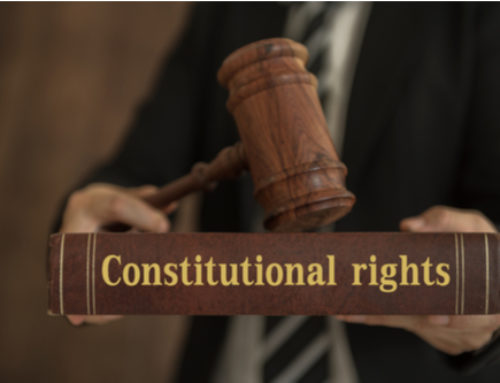If you’ve been charged with a felony crime in Arizona, you must defend yourself by all means available. A conviction could mean substantial fines and prison time, and many types of felony convictions are not eligible for expungement. This means that a conviction could stay on your record for the rest of your life—limiting your job opportunities, making it more difficult to find housing, and negatively impacting your life in various other ways.
While there are several potential defenses to felony charges in Arizona, the defenses you have available depend on the facts of your case. To determine how you can fight your felony charge, you will need to discuss your case one-on-one with an experienced criminal defense attorney.
7 Potential Defenses to Felony Charges in Arizona
With this in mind, here are some examples of potential defenses to felony charges in Arizona state court:
1. Lack of Evidence
Regardless of the charge (or charges) against you, the prosecution has the burden of proof. To secure a conviction, prosecutors must convince the jury (or the judge, if you choose a bench trial) that the allegations against you are true beyond a reasonable doubt.
This requires evidence.
If prosecutors do not have sufficient evidence of guilt, they cannot meet their burden of proof. If they can’t prove you are guilty, you are entitled to walk free. As a result, if your defense lawyer can show that the prosecution’s evidence is lacking, this can be enough to avoid a guilty verdict regardless of the facts at hand.
2. Evidence of Innocence
While you don’t need to prove that you are innocent to avoid a conviction in Arizona, if you can prove that you are innocent, this can be among the most effective ways to defend against a felony charge. Some examples of ways to prove that you are innocent include:
- Alibi – If you have an alibi, you can prove that you were elsewhere when the alleged crime was committed.
- Alternate Suspect – Even if you can’t prove an alibi, presenting evidence that someone else is the culprit could convince the judge or jury not to convict.
- Abandonment or Withdrawal – If your lawyer can show that you abandoned or withdrew from a planned or proposed felony, this can also serve as a complete defense.
Various forms of evidence can be used to prove evidence in a felony case. This includes everything from cell phone records to eyewitness testimony and video footage of your whereabouts. When you hire an experienced defense lawyer to represent you, your lawyer will determine what evidence he or she can present on your behalf in court.
3. Violation of Your Fourth Amendment Rights
The Fourth Amendment to the U.S. Constitution protects against unreasonable searches and seizures. Searches and seizures can be deemed “unreasonable” for various reasons, including (but not limited to):
- Lack of Reasonable Suspicion – To make a constitutional stop, the police must have “reasonable suspicion” that a person has committed (or is in the process of achieving) a crime. If the police stopped you without reasonable suspicion (i.e., if they profiled you), this can serve as a defense in your felony case.
- Lack of Probable Cause – Along with the “reasonable suspicion” requirement, the Fourth Amendment requires “probable cause” to obtain a warrant or arrest. Violations of your Fourth Amendment rights can also give rise to defenses before or during trial.
- Failure to Obtain a Warrant (When Required) – As a general rule, the police must obtain a warrant (based on probable cause) before executing a search. While there are some exceptions to the warrant requirement, executing a warrantless search can also give rise to defense in some cases.
To clarify, violating your Fourth Amendment rights does not automatically entitle you to a “not guilty” verdict in court. Rather, it provides grounds to file a motion for the prosecution’s unconstitutionally obtained evidence to be excluded from your trial. If prosecutors don’t have evidence they can present at trial, then they won’t be able to meet their burden of proof.
4. Violation of Your Fifth Amendment Rights
The Fifth Amendment provides several significant protections. One of the most important of these protections is the privilege against self-incrimination. Once the police take you into custody, they cannot interrogate you until they read your Miranda rights. Suppose the police interrogated you in custody without reading your Miranda rights (and you provided self-incriminating information). In that case, your lawyer may be able to file a motion to have this information suppressed from your trial.
5. Violation of Your Sixth Amendment Rights
The Sixth Amendment also provides several significant protections. These include the right to a speedy trial, the right to an impartial jury, and the right to an attorney. If you have been denied any of your Sixth Amendment rights, your lawyer may be able to use this to help you avoid a felony conviction as well.
6. Affirmative Defenses
Asserting an affirmative defense involves acknowledging that you committed the act in question but then arguing that you are not criminally culpable because your action was either justified or excused. There are several types of affirmative defenses, including:
- Self-defense
- Defense of others
- Necessity
- Duress or coercion
- Entrapment
- Intoxication
Affirmative defenses only apply in certain circumstances, and asserting them can be risky. As a result, if you believe you may have an affirmative defense, this is yet another reason to entrust your case to an experienced criminal defense attorney.
7. Statute of Limitations
Many (but not all) felonies in Arizona are subject to statutes of limitations. If you are being charged with a felony and the statute of limitations for your crime has expired, you should not have to stand trial. Your lawyer will be able to determine if the statute of limitations (if any) has expired. If so, your lawyer can take appropriate legal action on your behalf.
Speak with an Experienced Criminal Defense Lawyer in Phoenix, AZ
Are you facing a felony (or multiple felonies) in Arizona? If so, you need experienced legal representation. Call 480-405-7922 or contact us online to schedule a free consultation today.






